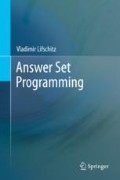Abstract
When a programmer solves a computational problem, this is usually accomplished by finding or designing an algorithm and encoding it in an implemented programming language. This book is about an alternative, declarative approach to programming, which does not involve encoding algorithms. A program in a declarative language only describes what is counted as a solution. Given such a description, a declarative programming system finds a solution by the process of automated reasoning. A program in a declarative language is an encoding of the problem itself, not of an algorithm.
Access this chapter
Tax calculation will be finalised at checkout
Purchases are for personal use only
References
AI Magazine, 37(3), 2016. Special Issue on Answer Set Programming.
Chitta Baral. Knowledge Representation, Reasoning and Declarative Problem Solving. Cambridge University Press, 2003.
Nicole Bidoit and Christine Froidevaux. Minimalism subsumes default logic and circumscription in stratified logic programming. In Proceedings of the Second Annual IEEE Symposium on Logic in Computer Science, pages 89–97, 1987.
Pawel Cholewiński, Victor Marek, and Miroslaw Truszczynski. Default reasoning system DeReS. In Proceedings of International Conference on Principles of Knowledge Representation and Reasoning (KR), pages 518–528, 1996.
Simona Citrigno, Thomas Eiter, Wolfgang Faber, Georg Gottlob, Christoph Koch, Leone Nicola, Cristinel Mateis, Gerald Pfeifer, and Francesco Scarcello. The dlv system: Model generator and application frontends. In Proceedings of Workshop on Logic Programming (WLP97), 1997.
Stephen A. Cook. The complexity of theorem-proving procedures. In Proceedings Third Annual ACM Symposium on Theory of Computing, 1971.
Martin Davis, George Logemann, and Donald Loveland. A machine program for theorem proving. Communications of the ACM, 5(7):394–397, 1962.
Yannis Dimopoulos, Bernhard Nebel, and Jana Koehler. Encoding planning problems in non-monotonic logic programs. In Sam Steel and Rachid Alami, editors, Proceedings of European Conference on Planning, pages 169–181. Springer, 1997.
Thomas Eiter, Nicola Leone, Cristinel Mateis, Gerald Pfeifer, and Francesco Scarcello. The KR system dlv: Progress report, comparisons and benchmarks. In Anthony Cohn, Lenhart Schubert, and Stuart Shapiro, editors, Proceedings of International Conference on Principles of Knowledge Representation and Reasoning (KR), pages 406–417, 1998.
Kit Fine. The justification of negation as failure. In Proceedings of the Eighth International Congress of Logic, Methodology and Philosophy of Science, pages 263–301. North Holland, 1989.
John Franco and John Martin. A history of satisfiability. In Armin Biere, Marijn Heule, Hans van Maaren, and Toby Walsh, editors, Handbook of Satisfiability, pages 7–74. IOS Press, 2009.
Martin Gebser, Marco Maratea, and Francesco Ricca. The design of the seventh Answer Set Programming competition. In Proceedings of the Fourteenth International Conference on Logic Programming and Nonmonotonic Reasoning, pages 3–9. Springer, 2017.
Michael Gelfond. On stratified autoepistemic theories. In Proceedings of National Conference on Artificial Intelligence (AAAI), pages 207–211, 1987.
Michael Gelfond. Answer sets. In Frank van Harmelen, Vladimir Lifschitz, and Bruce Porter, editors, Handbook of Knowledge Representation, pages 285–316. Elsevier, 2008.
Michael Gelfond and Yulia Kahl. Knowledge Representation, Reasoning, and the Design of Intelligent Agents: The Answer-Set Programming Approach. Cambridge University Press, 2014.
Michael Gelfond and Vladimir Lifschitz. The stable model semantics for logic programming. In Robert Kowalski and Kenneth Bowen, editors, Proceedings of International Logic Programming Conference and Symposium, pages 1070–1080. MIT Press, 1988.
Michael Gelfond and Vladimir Lifschitz. Logic programs with classical negation. In David Warren and Peter Szeredi, editors, Proceedings of International Conference on Logic Programming (ICLP), pages 579–597, 1990.
Malik Ghallab, Dana Nau, and Paolo Traverso. Automated planning and acting. Cambridge University Press, 2016.
Carla Gomes, Henry Kautz, Ashish Sabharwal, and Bart Selman. Satisfiability solvers. In Frank van Harmelen, Vladimir Lifschitz, and Bruce Porter, editors, Handbook of Knowledge Representation, pages 89–134. Elsevier, 2008.
Henry Kautz and Bart Selman. Planning as satisfiability. In Proceedings of European Conference on Artificial Intelligence (ECAI), pages 359–363, 1992.
Robert Kowalski. The early years of logic programming. Communications of the ACM, 31(1), 1988.
Nicola Leone, Gerald Pfeifer, Wolfgang Faber, Thomas Eiter, Georg Gottlob, Simona Perri, and Francesco Scarcello. The DLV system for knowledge representation and reasoning. ACM Transactions on Computational Logic, 7(3):499–562, 2006.
John Lloyd. Foundations of Logic Programming. Springer-Verlag, 1984.
Victor Marek and Miroslaw Truszczynski. Stable models and an alternative logic programming paradigm. In The Logic Programming Paradigm: a 25-Year Perspective, pages 375–398. Springer Verlag, 1999.
Ilkka Niemelä. Logic programs with stable model semantics as a constraint programming paradigm. Annals of Mathematics and Artificial Intelligence, 25:241–273, 1999.
Ilkka Niemelä and Patrik Simons. Efficient implementation of the well-founded and stable model semantics. In Proceedings Joint International Conference and Symposium on Logic Programming, pages 289–303, 1996.
Leon Sterling and Ehud Shapiro. The Art of Prolog: Advanced Programming Techniques. MIT Press, 1986.
Author information
Authors and Affiliations
Rights and permissions
Copyright information
© 2019 Springer Nature Switzerland AG
About this chapter
Cite this chapter
Lifschitz, V. (2019). Introduction. In: Answer Set Programming. Springer, Cham. https://doi.org/10.1007/978-3-030-24658-7_1
Download citation
DOI: https://doi.org/10.1007/978-3-030-24658-7_1
Published:
Publisher Name: Springer, Cham
Print ISBN: 978-3-030-24657-0
Online ISBN: 978-3-030-24658-7
eBook Packages: Computer ScienceComputer Science (R0)

